|
|
|
Sort Order |
|
|
|
Items / Page
|
|
|
|
|
|
|
| Srl | Item |
| 1 |
ID:
133977
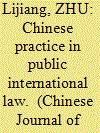

|
|
|
|
|
| Publication |
2014.
|
| Summary/Abstract |
This Survey covers materials reflecting Chinese practice in 2013 relating to: Fundamental Principles of International Law (The Principle of Equality of State Sovereignty; Permanent Sovereignty over Natural Resources; Prohibition of Threat or Use of Force; Peaceful Settlement of International Disputes; Non-intervention in Internal Affairs); Sources of International Law (Identification of Customary International Law; Guide to Practice on Reservations to Treaties; Provisional Application of Treaties); Relationship between International Law and Chinese Law (Act on Administration of Tax Collection Revised; Act on the Prevention and Control of Environmental Pollution by Solid Wastes Revised; Act on Seed Revised; Act on Animal Epidemic Prevention Revised; Act on Trade Mark Revised; Act on Fishery Revised; Act on Marine Environment Protection Revised; Act on Customs Revised); Recognition of New States (Palestine; Kosovo); Jurisdiction and Immunity (Scope and Application of Universal Jurisdiction; Immunity of State Officials from Foreign Criminal Jurisdiction); China's Territorial Integrity (Taiwan; Tibet; China-India Border; Diaoyu Island and its Affiliated Islands; Nansha Islands); Polar Regions (Arctic Council; Antarctic Treaty); International Law of the Sea (Submission to the Commission on the Limits of the Continental Shelf in part of the East China Sea; Commission on the Limits of the Continental Shelf (CLCS); International Seabed Authority (ISA); International Tribunal for the Law of the Sea (ITLOS); Marine Biodiversity beyond Areas of National Jurisdiction; Reorganization of State Ocean Administration); International Air and Space Law (Establishment of Air Defense Identification Zone in East China Sea; Peaceful Use of Outer Space; Transparency and Confidence-Building Measures in Outer Space; International Code of Conduct for Outer Space Activities); International Cyberspace Law (International Code of Conduct for Information Security; Cyber Crime); Aliens (Regulation on Administration of Exit and Entry); International Human Rights Law (Universal Periodic Review; Office of the High Commissioner for Human Rights (OHCHR); International Covenant on Civil and Political Rights (ICCPR); Convention against Torture and Other Cruel Inhuman or Degrading Treatment or Punishment (CAT); Convention on the Rights of the Child (CRC); Human Rights Treaty Bodies and Their Reform; Rights of Indigenous Peoples; Action Plan for Fighting Human Trafficking (2013-2020)); International Humanitarian Law (Protection of Civilians in Armed Conflicts; Protection of Journalists in Armed Conflicts); International Law on Disasters (Protection of Persons in the Event of Disasters); International Law on Arms Control, Disarmament and Non-proliferation (Nuclear Disarmament and Non-Proliferation; Chemical Weapons Convention; Biological Weapons Convention (BWC); Convention on Certain Conventional Weapons (CCW); Amended Protocol II to the CCW; Ottawa Convention; Convention on Cluster Munitions (CCM); Protocol V to the CCW (ERW); Improvised Explosive Devices (IEDs); Lethal Autonomous Robots; Arms Trade Treaty (ATT); Small Arms and Light Weapons; Conference on Disarmament (CD)); International Criminal Law (Crimes against Humanity; International Criminal Court (ICC); ICTY and ICTR; UN Comprehensive Convention against Terrorism; Agreement on the Procedure for Organizing and Conducting Joint Anti-Terrorist Exercises by Member States of the Shanghai Cooperation Organization; Agreement on the Procedure for Organizing and Conducting Joint Anti-Terrorist Operations within Member States of the Shanghai Cooperation Organization; Trafficking in Cultural Property; Ratification of the Treaty on Transfer of the Convicted between the People's Republic of China and the Republic of Kyrgyzstan; International Criminal Judicial Assistance and Police Cooperation); International Environmental Law (Climate Change; Sustainable Development; Protection of Atmosphere; Action Plan on Air Pollutio
|
|
|
|
|
|
|
|
|
|
|
|
|
|
|
|
| 2 |
ID:
141846
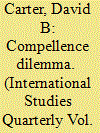

|
|
|
|
|
| Summary/Abstract |
This article introduces the idea of a compellence dilemma. This dilemma arises when the domestic policies of adversaries—such as hosting violent groups—threaten states’ security. Such states often consider coercive instruments to compel their adversary to change those policies. The problem? The prospect of costly punishment makes cooperation more attractive for the adversary. However, if they fail to coerce policy change, harsh punishments can reduce the adversary's capacity to enact policy change and induce harmful domestic instability. These problems are compounded by the fact that both the threatened states’ incentive to use costly punishments and the costs of failed compellence increase with the severity of the security threat. The logic of the compellence dilemma applies whenever a state uses damaging coercive instruments but risks failing to achieve its immediate objectives. I analyze the compellence dilemma with a dynamic game-theoretic model of interaction among a target state, host state, and violent group, and show that it is pervasive in equilibrium. I show that the compellence dilemma causes states to refrain from using harsh punishments even when they would compel the host state to cooperate. Concerns about decreasing future host-state capacity and increasing group power drive this result.
|
|
|
|
|
|
|
|
|
|
|
|
|
|
|
|
| 3 |
ID:
120877
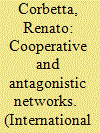

|
|
|
|
|
| Publication |
2013.
|
| Summary/Abstract |
In recent years (social) network approaches have been gaining ground in the field of international relations. Networks between states effectively explain patterns of international conflict and cooperation. One issue where conflict and cooperation converge-and where network analysis finds fruitful application-is the issue of third-party states' intervention in conflicts. This study investigates whether, and how, conflict expands in the international social space through the cooperative and antagonistic networks generated by states' supportive and oppositional interventions in international disputes. The study adopts a sociological theory of social units' interaction in the social space as a function of their multidimensional affinity to investigate further how such networks form. The hypotheses derived from this theoretical framework are tested using data on third-party non-neutral intervention in post-World War II militarized interstate disputes from Corbetta and Dixon (2005). Proximity in the international social space effectively predicts the creation of cooperative ties (supportive interventions) between states, while social distance predicts antagonistic ties (oppositional interventions).
|
|
|
|
|
|
|
|
|
|
|
|
|
|
|
|
| 4 |
ID:
131512


|
|
|
|
|
| Publication |
2014.
|
| Summary/Abstract |
This research note highlights an important element missing from rational design theories of international agreements: "institutional context"-the presence or absence of existing and prior agreements between prospective partners in "new" cooperation. If, as rational design theorists argue, agreement design is deliberate, strategic, and directed toward enhancing contracting parties' ability to credibly commit to future cooperation, then prior design "successes" should influence the terms of additional cooperation. We test for this omitted variable problem in three agreement design outcomes: ex ante limitations on agreement duration, exit clauses, and dispute-settlement provisions. Through an augmentation and reanalysis of data from a key study in the rational design literature-Barbara Koremenos's "Contracting Around International Uncertainty"-we show institutional context is positively correlated with inclusion of ex ante time limitations in negotiated agreements and negatively correlated with the inclusion of exit clauses and third-party dispute-settlement provisions. Institutional context also mediates and conditions the effects of the explanatory variable at the heart of existing rational design theories-uncertainty about the future distribution of gains from cooperation. Our findings show that the collective appeal of particular design features varies not only with the nature of underlying strategic problems, but also with degrees of shared institutional context.
|
|
|
|
|
|
|
|
|
|
|
|
|
|
|
|
| 5 |
ID:
146146


|
|
|
|
|
| Summary/Abstract |
Selection effects in crisis bargaining make it difficult to directly measure audience costs because state leaders have an incentive to avoid incurring audience costs. We overcome this inferential problem of selection bias by using a structural statistical model. This approach allows us to estimate the size of audience costs, both incurred and not incurred, in international crises. We show that although audience costs exist for state leaders of various regime types, democratic leaders face larger audience costs than nondemocratic leaders do. Audience costs can be so large that war might be preferable to concessions, especially for leaders of highly democratic states. Audience costs also increase a state's bargaining leverage in crises because the target state is more likely to acquiesce if the challenge carries larger audience costs. We also find evidence that audience costs generate selection effects.
|
|
|
|
|
|
|
|
|
|
|
|
|
|
|
|
| 6 |
ID:
110537
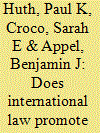

|
|
|
|
|
| Publication |
2011.
|
| Summary/Abstract |
In this article, we explain the role of international law in the resolution of territorial disputes from 1945 to 2000. In doing so, we focus on three outcomes of interest. First, when do states choose to revise the territorial status quo through negotiations instead of force? Second, when are states able to reach a final settlement? Third, when do states prefer a process of legal dispute resolution (i.e., adjudication or arbitration) to bilateral negotiations? To answer these questions, we argue that when the legal principles relevant to the dispute are unambiguous and clearly favor one side, a law-based focal point will emerge. This focal point, in turn, facilitates the settlement process by helping leaders overcome distribution problems, a central obstacle in reaching a final agreement. We find strong and consistent empirical support for our hypotheses regarding international law and peaceful dispute resolution.
|
|
|
|
|
|
|
|
|
|
|
|
|
|
|
|
| 7 |
ID:
110907
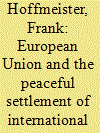

|
|
|
|
|
| Publication |
2012.
|
| Summary/Abstract |
Under its quasi-constitutional mandate to strive for the peaceful settlement of international disputes, the European Union (EU) acts as litigator and political mediator in diplomatic practice. Accordingly, this article presents the legal foundations and practical material where the Union litigated cases as a party before the World Trade Organization or UN Convention on the Law of the Sea dispute settlement bodies, or submitted amicus curiae briefs before international tribunals. It then recalls the EU's contributions to conflict management through military, police, rule of law and border missions based on a request from the third party or the third parties involved. Moreover, the EU's role in the conflicts between Russia and Georgia, in the Cyprus problem and in the Slovenia/Croatia border conflict is reviewed. The author concludes that there is ample evidence of relevant Brussels-based practice supporting the principle of peaceful settlement of international disputes, as enshrined under Article 33 of the UN Charter. The fact that such practices stem from an international organization shows that the principle remains a major achievement of the global legal system, which encompasses all international actors.
|
|
|
|
|
|
|
|
|
|
|
|
|
|
|
|
| 8 |
ID:
047618


|
|
|
|
|
| Publication |
London, Duke University Press, 1999.
|
| Description |
320p.
|
| Standard Number |
0822323648
|
|
|
|
|
|
|
|
|
|
|
|
Copies: C:1/I:0,R:0,Q:0
Circulation
| Accession# | Call# | Current Location | Status | Policy | Location |
| 043554 | 341.09/BOY 043554 | Main | On Shelf | General | |
|
|
|
|
| 9 |
ID:
133147


|
|
|
|
|
| Publication |
2014.
|
| Summary/Abstract |
Are Directive Strategies in international disputes the most effective mediation method for obtaining durable peace? A standard statistical analysis shows no effect of Directive Strategies on settlement durability. This result however, is misleading, failing to take selection and indirect effects into account. In this article, I identify when selection and process effects reinforce or oppose each other. Directive Strategies have opposing negative selection and positive process effects, which can distort inferences about their influence. Strategies' direct and indirect effects are also examined. Directive Strategies are more likely to lead to Full Settlements - the most comprehensive form of agreement, which improve the settlement durability (an indirect effect). However, Directive Strategies are used in more intractable disputes that result in fragile settlements (a direct effect). A statistical analysis of international disputes that takes these conflicting dynamics into account demonstrates the efficacy of Directive Mediation Strategies in producing durable agreements.
|
|
|
|
|
|
|
|
|
|
|
|
|
|
|
|
| 10 |
ID:
133625
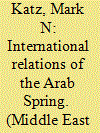

|
|
|
|
|
| Publication |
2014.
|
| Summary/Abstract |
Revolution does not just change things inside one country. It can disrupt international relationships throughout an entire region or even the world. What impact have the "Arab Spring" revolutions had on the international relations of the countries experiencing them, the Middle East, and the world? Have these upheavals been as disruptive of international relations as other revolutions? It will be argued here that, unlike what would occur if revolution succeeded in Syria or Bahrain, the Arab Spring revolutions that have succeeded in Tunisia, Egypt, Libya and Yemen have had a remarkably nondisruptive impact on international relations. To understand just how remarkable this is, though, something needs to be said about just how much revolution has disrupted international relations in the past.
|
|
|
|
|
|
|
|
|
|
|
|
|
|
|
|
| 11 |
ID:
073372
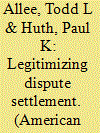

|
|
|
|
|
| Publication |
2006.
|
| Summary/Abstract |
We develop and test a general argument about the conditions under which state leaders are most likely to choose legal dispute resolution over bilateral negotiations as a means to settle international disputes. Our central claim is that leaders who anticipate significant domestic audience costs for the making of voluntary, negotiated concessions are likely to seek the "political cover" of an international legal ruling. In such cases, it will be easier for leaders to justify the making of concessions if they are mandated as part of a ruling by an international court or arbitration body. We test a series of domestic-level hypotheses using a dataset comprised of nearly 1,500 rounds of talks concerning disputed territorial claims. Our multivariate analyses indicate that state leaders opt for legal dispute resolution when they are highly accountable to domestic political opposition, as well as when the dispute is highly salient to domestic audiences.
|
|
|
|
|
|
|
|
|
|
|
|
|
|
|
|
| 12 |
ID:
131810
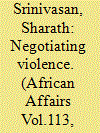

|
|
|
|
|
| Publication |
2014.
|
| Summary/Abstract |
A decade ago international peacemakers turned a blind eye when violence in Darfur, Sudan, first escalated into civil war. This article addresses the war's brutal beginnings, using a close reading of internal communications, interviews, and public statements to deepen our understanding of the predicament that key peacemakers found themselves in, and dug themselves into. For a long first year, when the majority of violent deaths in Darfur occurred, peacemakers employed a set of discursive strategies that intentionally depoliticized Darfur's conflict. Despite knowledge to the contrary, peacemakers carefully avoided connections between Darfur and the ongoing north-south peace negotiations they were championing to end Sudan's long second civil war. These ideational moves gave peacemakers a degree of cover for not responding directly to the conflict, but they also shaped the political calculations and opportunities of domestic actors in ways that further enabled armed violence, ultimately leading to policy failure. The problems of peacemaking in Sudan highlight the particular challenges that arise from negotiating peace. Negotiations give words a privileged place in taming the materiality of violence, yet this also leaves peacemakers liable to shaping new trajectories of political violence born out of local dissatisfaction with the prospects for peace.
|
|
|
|
|
|
|
|
|
|
|
|
|
|
|
|
| 13 |
ID:
126955
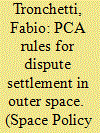

|
|
|
|
|
| Publication |
2013.
|
| Summary/Abstract |
Outer space activities have evolved significantly. While they were previously the exclusive domain of a restricted number of states, now thanks to technological advances and the easing of governmental restrictions, space activities are carried out on a much larger scale and involve subjects of both a governmental and non-governmental nature. Furthermore, the commercial uses of outer space are making space business increasingly profitable and attractive to potential investors. As the economic value of outer space activities, as well as the number of space actors grows, it is nearly inevitable that international disputes related to the use of outer space will occur. Until recently, international space law contained little dedicated machinery to settle international outer space-related disputes. This absence significantly weakened the applicability and enforceability of space law and contributed to a climate of uncertainty. In order to address these issues, the Permanent Court of Arbitration (PCA) adopted the Optional Rules for Arbitration of Disputes Relating to Outer Space Activities on 6 December 2011. The PCA Space Rules represent a significant development in the field of space law because they provide a voluntary and binding dispute settlement method accessible to all space actors and modeled on the specific legal and economic characteristics of space activities. This paper describes the genesis of the PCA Space Rules, assesses their content and innovative character, evaluates their possible implications for the settlement of outer space disputes, and argues that they should be positively received by the outer space community.
|
|
|
|
|
|
|
|
|
|
|
|
|
|
|
|
| 14 |
ID:
100804
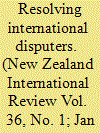

|
|
|
| 15 |
ID:
046395
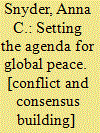

|
|
|
|
|
| Publication |
Aldershot, Ashgate Publishing Limited, 2003.
|
| Description |
viii, 153p.
|
| Standard Number |
0754619338
|
|
|
|
|
|
|
|
|
|
|
|
Copies: C:1/I:0,R:0,Q:0
Circulation
| Accession# | Call# | Current Location | Status | Policy | Location |
| 046498 | 327.172/SNY 046498 | Main | On Shelf | General | |
|
|
|
|
| 16 |
ID:
126245
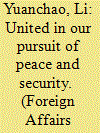

|
|
|
|
|
|
|
|